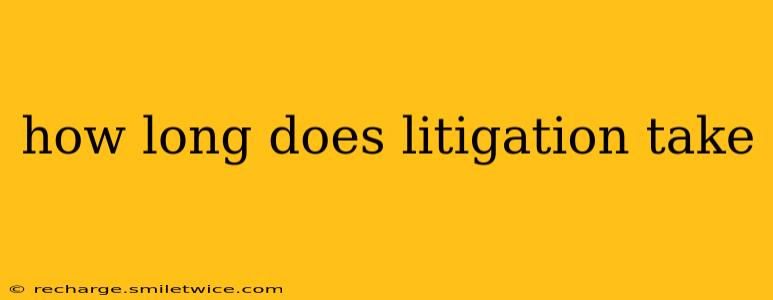How Long Does Litigation Take? A Comprehensive Guide
The length of litigation is notoriously unpredictable, varying wildly depending on numerous factors. There's no single answer to "how long does litigation take?", but understanding the key influences can help you manage expectations and plan effectively. This guide will explore the various elements that determine the timeline of a lawsuit, answering common questions along the way.
What Factors Influence the Length of Litigation?
Several crucial factors significantly impact how long a legal case might last:
-
Complexity of the Case: Simple cases, such as straightforward debt collection or minor traffic violations, may resolve relatively quickly. Complex cases involving multiple parties, intricate financial transactions, or extensive expert testimony can drag on for years.
-
Jurisdiction: The court's caseload, the rules of procedure, and the judge's management style all play a role. Some jurisdictions are known for faster processing times than others.
-
Discovery Phase: This crucial stage involves exchanging information between parties. It can be lengthy, especially in complex cases requiring extensive document review, depositions, and interrogatories. The more extensive the discovery, the longer the litigation process.
-
Negotiations and Settlements: Many cases settle before trial. The willingness of parties to negotiate and compromise significantly affects the overall timeline. Successful mediation or arbitration can drastically shorten the process.
-
Trial and Appeals: If a case goes to trial, the length depends on the complexity of the evidence, the number of witnesses, and any potential appeals. Appeals can add significant time to the overall litigation timeline.
-
Type of Case: The type of case greatly influences the timeframe. For example, family law cases might be resolved faster than complex commercial disputes. Criminal cases often have stricter time constraints compared to civil cases.
How Long Does Litigation Take in Different Types of Cases?
While generalizations are difficult, here's a broad overview:
-
Small Claims Court: These cases are generally resolved much faster, often within a few months.
-
Personal Injury Cases: These can range from a few months to several years, depending on the severity of the injuries and the complexity of the insurance claims.
-
Family Law Cases: Divorce, custody, and child support cases can take anywhere from several months to a couple of years, particularly if highly contested.
-
Commercial Disputes: These often involve extensive discovery and complex legal arguments, potentially lasting several years.
-
Class Action Lawsuits: These can take many years to resolve, often involving multiple phases of litigation and appeals.
What are the Stages of Litigation?
Understanding the stages helps you grasp the potential timeline:
-
Pleadings: Filing the initial complaint or petition, and the defendant's response.
-
Discovery: Gathering evidence through depositions, interrogatories, document requests, and expert witness testimony.
-
Motions: Filing motions to dismiss, for summary judgment, or for other relief.
-
Trial (if necessary): Presenting evidence and arguments before a judge or jury.
-
Judgment and Post-Trial Motions: The court's decision and any subsequent motions.
-
Appeal (if applicable): Challenging the lower court's decision in a higher court.
How Can I Speed Up the Litigation Process?
While you can't control all factors, you can proactively influence the timeline:
-
Choose a good lawyer: An experienced attorney who understands efficient case management can save time.
-
Cooperate in discovery: Avoid unnecessary delays by promptly responding to requests for information.
-
Consider alternative dispute resolution: Mediation or arbitration can often resolve disputes faster than a trial.
-
Be realistic about settlement: A willingness to negotiate realistically can prevent lengthy litigation.
In conclusion, there's no magic number for how long litigation takes. The timeframe depends on a complex interplay of factors. Understanding these factors and working proactively with your legal counsel is key to navigating the process as efficiently as possible. Remember, patience and realistic expectations are vital during litigation.
